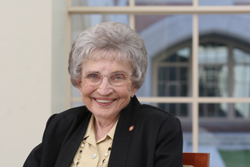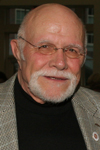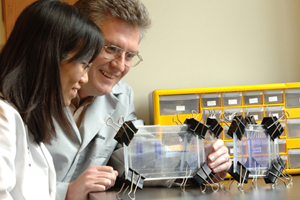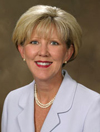
|
TOP STORIES |
|
HIGHEST HISPANIC RANKING YET For the second time in three years, Hispanic Business magazine has ranked the College of Medicine in the top 10 nationally for Hispanics. And this year's ranking is higher than ever. The magazine’s September issue rated the medical school No. 7, up from No. 11 last year and No. 9 in 2007 (the first time FSU participated in the survey). The magazine considered a variety of factors, including the percentage of full-time Hispanic faculty, services for Hispanic students, Hispanic recruitment efforts and retention rates, and the percentage of Hispanic students enrolled. See the complete list.
FILLING A NEED FOR FAMILY PHYSICIANS Once again, the College of Medicine is among the top five in the nation in the percentage of graduating doctors who choose family medicine, according to the American Academy of Family Physicians. Over a three-year period, about 17 percent of FSU College of Medicine graduates entered family medicine residencies. That meant a national ranking of fourth in 2008 and a tie for fourth in 2009. No other medical school in Florida ranked among the top 60. Read more about the rankings.
FAREWELL TO A GENEROUS DONOR
She was born April 11, 1928, in Gainesville. Her father built Powell's Modern Cottages in Gainesville, and all of his children later entered the hotel business. Ms. Powell started in 1946 at the Florida State College for Women (which would become Florida State University) and graduated in the Class of 1950. She was awarded a Master of Arts degree in social work from FSU in 1963. For many years she and her sister Esther were co-owners and operators of the Holiday Inn in nearby Thomasville, Ga. During that time, the hotel began hosting the Seminole football team before its home games in Tallahassee. She was a past president of the Thomasville Restaurant & Lodging Association, and she was named by Gov. George Busbee to the Board of Industry and Trade.
Ms. Powell’s credentials as a football fan were impressive. She founded the Southwest Georgia Seminole Club in Thomasville and was one of the original Golden Chiefs. She also was the first woman to serve on the board of directors of Seminole Boosters, a post she held from 1974 to 1984.
Her generosity to FSU has included gifts to endow the Mina Jo Powell Presidential Scholarship Fund and to help establish the FSU College of Medicine.
GOODBYE TO A PIMS PIONEER
“Paul laid the groundwork for us,” Myra Hurt, senior associate dean for research and graduate programs, told the Tallahassee Democrat. "We owe a great deal to him."
From 1971 to 1978 Elliott was the first director of FSU's Program in Medical Sciences (PIMS), which was designed to address the need for physicians in the rural areas of Northwest Florida. Through PIMS, students completed their first year of medical school at FSU and then transferred to the University of Florida to complete their medical education. Hurt was the last director of PIMS. All four former directors, including Elliott, attended the alumni reunion in April.
Around Tallahassee, Elliott also was known as a master gardener, a fine cook, a co-founder of the Miccosukee Land Co-op and someone who worked well with students.
INFLUENTIAL
LAB
GOLD MEDAL More good news about Blaber: In August he received the E.K.Frey-E. Werle Gold Medal at the 2009 International Symposium on Kallikreins in Munich, Germany. The internationally recognized award cited Blaber’s research into human kallikrein-related peptidases.
RUBBING ELBOWS WITH THE FIRST LADY Elena Reyes, Ph.D., associate professor of medical humanities and director of the behavioral science curriculum, recently received a Service Learning Faculty Award from the Florida Campus Compact. The award was presented at the Freedom Tower at Miami Dade College, and Michelle Obama was guest speaker. The award honors one faculty member in each of the three higher education sectors (state universities, community colleges, and independent colleges and universities) for contributing to the integration of service learning into the curriculum. “The Freedom Tower,” Reyes wrote before the ceremony, “is where Cuban refugees were processed in the ’60s and received their medical care. I spent countless hours there as a little girl with my grandmother. X number of years later, I’ll be there again … this time to receive an award with the first lady as guest speaker.”
RED-LETTER DAY Reyes also has her own day on the Attorney General’s Office Hispanic Heritage Month online calendar. If you visit the calendar and click on Oct. 12, here’s some of what you’ll read:
“Elena was born in Cardenas, Cuba and came to Miami with her family in 1957. She grew up being keenly aware of the unmet health care needs of the Spanish-speaking population. After earning her Ph.D. in Clinical Psychology, interning and serving on the faculty at the Baylor College of Medicine in Houston, she returned to Miami, where she developed the Pediatric Behavioral Medicine Program at Miami Children’s Hospital. Elena returned to Tallahassee in 1991 and maintained a private practice while working pro bono with migrant families in the adjacent county whose access to care was limited by cultural and linguistic barriers… Dr. Reyes has a long history of clinical service and research with Latino migrant farm-working families.”
HIGH-PROFILE APPOINTMENTS Les Beitsch, M.D., J.D., associate dean for health affairs, has been appointed to the Institute of Medicine’s Committee on Public Health Strategies to Improve Health. Sponsored by the Robert Wood Johnson Foundation, this study will involve approximately 11 meetings over a two-year period. The committee’s tasks include developing recommendations for state and local funding mechanisms or structures that would support the needs of public health departments after health care reform, and reviewing the role of score cards and other measures or assessments in summarizing the impact of the public health system.
Beitsch also has been named to the board of directors of the Public Health Accreditation Board. He will have a significant role in governing the organization, which works with leading experts to develop a voluntary national accreditation program for public health departments. The organization’s ultimate goal is improving all public health services and, in turn, promoting a healthier public. “I am truly honored by the opportunity to work with PHAB to craft the first ever accreditation system for public health departments,” Beitsch said. Since May 2007, PHAB has worked with state, local and territorial officials to align national standards for all U.S. public health departments. With help from the Centers for Disease Control and the Robert Wood Johnson Foundation, it finished the first draft of the standards earlier this year. “This work is critical because in this time of H1N1 and other health crises, it is state and local health departments that are responsible for protecting the health of all Americans,” Beitsch said. “The public must be confident that health departments can meet standards that ensure their protection and improve the health of the community.”
WORLD-CLASS Edgar Jimenez, M.D., a member of the clerkship faculty at the College of Medicine's regional campus in Orlando, was elected president of the World Federation of Societies of Intensive and Critical Care Medicine at the group’s 10th World Congress in Florence, Italy.
SHANGHAI JOURNEY Branko Stefanovic, Ph.D., associate professor of biomedical sciences, was invited to give an oral presentation in October at the 7th Annual Congress of International Drug Discovery Science and Technology in Shanghai. Title: “Specific Regulation of Type I Collagen Expression as Target for Antifibrotic Therapy.”
PAPER IN PARIS Charles Maitland, M.D., neurology professor, and Leonard LaPointe, M.D., presented a paper titled “Effects of Cognitive-Linguistic Load on Spatial and Temporal Gait Parameters During On-Off Medication Cycles in Parkinson’s Disease” at the Movement Disorder Society’s 13th International Congress of Parkinson’s Disease and Movement Disorders in Paris. Justin Ruoss, Class of 2010, and Justin Casey, Class of 2011, were co-authors.
EXCELLENCE IN TEACHING
HIGHEST AWARD Donna Jacobi Pruett, M.D., geriatrics clerkship director at the Pensacola regional campus, recently received from the Florida Council on Aging the Dr. Carter Osterbind Outstanding FCOA Member Award – the highest member award the council makes. A member of FCOA for about seven years, she serves as the District 1 representative to its Board of Trustees and has rotated service on membership, program, marketing and advocacy committees. This is an excerpt from the program: “Dr. Donna Jacobi is truly one of those rare physicians who are healers, volunteers, activists and visionaries. She has dedicated her life to the field of medicine, with a specialty in geriatric care, and recognizes the importance of the ‘holistic’ approach of elder care…. Her latest project is a service called ElderCare, which provides temporary in-home services to newly discharged hospital patients who do not have a caregiver.”
FRESH WHITE COATS
“The white coat is a symbol, a symbol of what you have been working towards, and of the profession you are now entering. Your coats are now just a blank symbol, a plain piece of white fabric, perhaps magical, but without substance. From this day forward you will be adding substance. You will be adding your individual experiences, each experience stitched or sewn, repaired or patched, things put in pockets; each serving as a memory and reminder of your life as a physician. Some days your coat will feel tattered, its fabric torn by the death of a loved patient. Some days it will feel wrinkled, exhausted by long hours and emotional drain. Sometimes it will have sticky places, left by that lollipop a child somehow let fall against you when giving you a hug…. Most often it will feel like a badge of honor, a rich symbol of the pride you feel in being a physician.”
(About the artwork by Drew Garber, Class of 2013: The group shot of white-coated first-year students was postponed several times and finally scheduled for Oct. 7, when you'd think the weather would have been a bit cooler. But at noon, the courtyard was toasty. And one student, who had given blood that morning but not yet eaten lunch, actually fainted -- as the drawing shows. The dauntless photographer continued his work. And through the magic of Photoshop, even the student who swooned was included.) |
 |
 |
 |
| E-mail Alumni Affairs Phone: 850-645-9428 | ||
|
|
|
Florida State University
|
College of Medicine
|
Copyright 2013
|
 In September
the College of Medicine lost one of its chief supporters when businesswoman,
entrepreneur and community leader Mina Jo Powell died. “Mina Jo was a
wonderful friend of the College of Medicine who recognized our potential
early,” Dean John Fogarty said. “We are grateful for her support and her
guidance in our early years.” Beyond the College of Medicine, the whole
university has benefited from Ms. Powell’s talents and generosity. In fact,
adjacent to the Longmire Alumni Building is the Mina Jo Powell Alumni Green,
named in 1990 to honor her lifelong service to the university she attended.
In September
the College of Medicine lost one of its chief supporters when businesswoman,
entrepreneur and community leader Mina Jo Powell died. “Mina Jo was a
wonderful friend of the College of Medicine who recognized our potential
early,” Dean John Fogarty said. “We are grateful for her support and her
guidance in our early years.” Beyond the College of Medicine, the whole
university has benefited from Ms. Powell’s talents and generosity. In fact,
adjacent to the Longmire Alumni Building is the Mina Jo Powell Alumni Green,
named in 1990 to honor her lifelong service to the university she attended.
 Paul
Elliott, Ph.D., one of the key people who set the stage for a medical school
at Florida State University, died Oct. 24 of heart failure. He was 76.
Paul
Elliott, Ph.D., one of the key people who set the stage for a medical school
at Florida State University, died Oct. 24 of heart failure. He was 76.

 In the
first year of journalism school, there was no ceremony in which the
professors handed you a typewriter, shook your hand and, in front of God and
your parents and everyone, spoke eloquently about the enormous joys and
responsibilities lurking behind those keys. There was nothing, in other
words, like the College of Medicine’s White Coat Ceremony. In August, the
119 members of the Class of 2013 got to slip on their white coats for the
first time. And they got to hear a host of speakers articulate what that
white coat represents. Here is an excerpt from the remarks of
In the
first year of journalism school, there was no ceremony in which the
professors handed you a typewriter, shook your hand and, in front of God and
your parents and everyone, spoke eloquently about the enormous joys and
responsibilities lurking behind those keys. There was nothing, in other
words, like the College of Medicine’s White Coat Ceremony. In August, the
119 members of the Class of 2013 got to slip on their white coats for the
first time. And they got to hear a host of speakers articulate what that
white coat represents. Here is an excerpt from the remarks of 